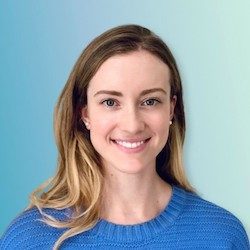In this Q&A, we’re catching up with Kayleigh Foley, who graduated from our Intermediate Coding Bootcamp in 2018. Today, she’s a Software Engineer at Smartcar.
Below, Kayleigh reflects on her experience learning to code, the benefits of working at a smaller company like Smartcar, and the creative freedom that coding provides.
How did you get into software engineering after getting a bachelor’s in Biochemistry & Molecular Biology?
During my first few years after graduating, I struggled to find a career that paid well, motivated me to grow, or that I very much enjoyed. I stumbled upon coding as a career path while looking into building a website for my art hobby and simultaneously noticed many authors of the financial independence blogs I followed were web developers.
More internet searches opened my eyes to the growth opportunities, lucrativeness, and endless learning potential within a coding career, as well as the possibility that with time and effort I could succeed even without a CS degree. I quickly became committed to making this career transition a reality.
What was the first step you took to learn coding fundamentals?
I found free and low-cost tutorials online and started learning the basics of HTML, CSS, and JavaScript in my spare time after work. Having never seen a line of code before this, I was blown away by how fun and approachable coding could be. I quickly started seeing the possibilities of what I could build and made a goal for myself to build a website for my art from scratch, rather than using a website builder. A few months later, I learned about coding bootcamps and knew if I wanted to make the jump to switch careers, this was the next step for me. Soon after, I found Hack Reactor.
After graduating from Hack Reactor, you first worked at Intercom. What was that like?
When I started, Intercom already had an engineering team of over 200, so I was able to learn from its established processes and workflows and experience how a large engineering organization operates day-to-day.
I quickly realized there’s so much more to the job besides coding, from code reviews to writing documentation to collaborating with designers, marketers, and other engineering teams — a lot of which can be hard to grasp through studying software engineering alone. This being my first job in the field, I was grateful to have been given the time and space to become familiar with all these processes without feeling pressured to immediately start delivering new features.
After moving to Smartcar in 2020, how did the dynamic change working with a smaller engineering team?
On one hand, I found it a surprisingly smooth transition moving from a company of a couple of hundred engineers to an engineering team of less than ten. The day-to-day feels similar in a lot of ways: biweekly sprint structure, daily standups, code reviews, roadmap planning meetings, similar workflow tools, (etc.).
On the other hand, I think we move much faster with a smaller team, simply because there are fewer people that need to discuss, review, and approve projects or ideas. I still get to work with design and marketing on a daily basis, but when those teams are only 1 to 2 people, we can iterate on work very quickly. Also, because my team owns a large portion of the product at Smartcar, I’ve found that I have more ownership and autonomy over projects and tasks, along with greater input around new features or ideas.
What is your favorite project you’ve completed at Smartcar so far?
I have two. Soon after starting, my team set out on a four-month project to relaunch our marketing site with an entirely new code base and brand design. Getting to rebuild an entire website from scratch is a fun project that doesn’t come around very often, and I loved collaborating with my team to break down the site designs into modular components and choose the best tools for our needs.
The other project was a microsite designed to help customers learn how to set up a connected services account for their vehicle. I’m fond of that project as it was the first where I fully owned the planning, building, and execution end to end. Its successful launch was a big boost of confidence in my career as a software engineer.
What is your favorite aspect of software engineering? Given your background in illustration, do you find you like to focus on UI or UX?
I think my favorite aspect of coding is the creative freedom it provides. For any idea that comes to mind for an app, website, or small CSS animation, I have the ability to open a code editor and start making that idea come to life. In many ways, it’s now just another medium for my art.
Since I started coding, I’ve always been more drawn to the “front of the front-end,” finding myself most interested in the tools that control the look and feel of a web element as well as how that element is perceived by the user. I’m looking forward to taking some courses in UI and UX design to expand my knowledge in these areas further.
What is one piece of advice you would give to someone interested in pursuing a career in coding?
Take advantage of all the free or low-cost resources available online, like introductions to HTML, CSS, JavaScript, or other programming languages, to find what interests you. Then just start building stuff! Anything from button animations to small apps, games, or websites. No matter how inexperienced you feel, like anything else you’ll get better with practice. It’s amazing how more and more people in this field come from non-traditional CS backgrounds, but it definitely takes a commitment to learning new things regularly, which is much easier when you’re genuinely interested in what you’re learning and working on.

